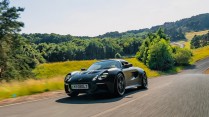Nissan's Future Electric GT-R Harnesses Solid-State Technology, Set for 2028: Report
By Dabbie Davis
Jun 11, 2024 01:14 AM EDT

Speculation has circulated for some time regarding the anticipated release of the upcoming GT-R model; however, Nissan has not officially announced any concrete production schedules. If these rumors hold true, the next iteration of the GT-R could potentially mark Nissan's debut in incorporating solid-state battery technology into its sports car lineup.
Solid-State Battery for Nissan GT-R
Buzz stated that one of Nissan's plans is to build an electric GT-R with solid-state battery. According to insights from MotorTrend, Nissan appears to be either proceeding cautiously with the development of the next-generation GT-R or deliberately keeping recent updates under wraps.
There is currently no sign of an imminent hybrid model introduction. Instead, indications point towards Nissan prioritizing advancements in battery technology, with plans to wait for the availability of enhanced solid-state batteries before transitioning to a fully electric GT-R replacement.
Nissan's strategic direction hints at the integration of more advanced and lighter solid-state batteries undergoing testing by 2026, with a targeted rollout in production vehicles by 2028.
Additionally, Nissan has made a firm commitment to cease the development of new combustion engine systems and utilize existing technologies until the transition to fully electric platforms is finalized in the coming decade.
Introducing an all-electric GT-R integrated with solid-state battery technology could potentially resolve longstanding challenges associated with the GT-R, notably in regions like Europe where noise regulations led to its exclusion.
The adoption of solid-state batteries might help maintain the car's weight below 4,000 pounds, preserving some of its current characteristics while offering the advantages of a silent and emission-free operation.
Nissan's futuristic Hyper Force concept, a precursor to an electric supercar inspired by the GT-R, showcased remarkable power with 1,341 hp (1,000 kW), hinting at the high-performance potential of Nissan's electric future.
Additional Details for This Development
Nissan intends to switch to solid-state battery technology by 2028, but a recent CarBuzz article claimed that some of its electric vehicles, including the Ariya, are now powered by lithium-ion batteries. Nissan made the decision to begin testing solid-state batteries this year, which will cause the market for electric cars to shift.
Compared to its lithium-ion counterparts, solid-state batteries have a higher energy density, a lower weight, and faster charging times. Furthermore, CarBuzz reports that Nissan may choose to include solid-state batteries in the upcoming GT-R.
While Toyota aims to adopt solid-state technology a year earlier, their production capacity remains limited to "several tens of thousands of vehicles." CarBuzz has recently highlighted rumors surrounding the anticipated next-generation Nissan GT-R, aiming to sift through the speculations to identify the most credible insights.
As stated on its report, even while the current GT-R model isn't as competitive as some of its rivals in some areas, it may continue to be popular.This is due its remarkable performance and handling qualities, which have endured since its revolutionary release. Fans who were hoping for a gas-powered R36 version might be disappointed by Nissan's decision to stop making investments in ICE technology.
But excitement is generated by the thought of the new model. The Hyper Force concept, which combines aggressive styling with a powerful 1341 horsepower power output, provides a promising look at the upcoming GT-R and suggests an exciting performance potential.
RELATED ARTICLE: Nissan Shifts Away from ICE Funding, Amidst Rivals Focus on New Gas Engines
Copyright @ MOTORTIMES, All rights reserved. Do not reproduce without permission.








